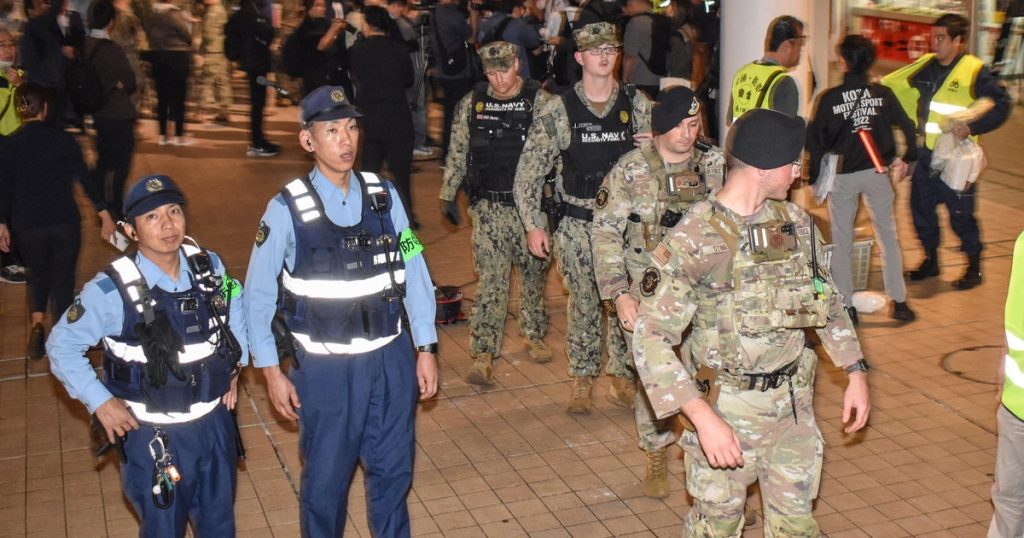Two U.S. Marines stationed in Okinawa, Japan, are currently under investigation for alleged sexual assaults against Japanese women, intensifying tensions between U.S. military personnel and local residents. This investigation is the latest incident in a series of sexual assault cases that have caused outrage within the community. As officials and residents grapple with these allegations, they highlight a deepening mistrust surrounding the U.S. military’s presence in the region.
| Article Subheadings |
|---|
| 1) Details of the Allegations |
| 2) Responses from U.S. Officials |
| 3) Community Reaction and Safety Measures |
| 4) Historical Context of U.S.-Japan Relations |
| 5) Implications for Future Military Presence |
Details of the Allegations
The police reported that a U.S. Marine in his 20s is suspected of raping a Japanese woman at a military base in March, additionally injuring another woman in the process. Another Marine, also in his 20s, is alleged to have raped a Japanese woman at a U.S. facility in January. Both cases have now been referred to prosecutors for further legal action. According to local authorities, the alleged assault in March occurred in a restroom, where one woman was injured while attempting to intervene during the assault on her friend.
Responses from U.S. Officials
U.S. Ambassador to Japan, George Glass, has stated that Washington will cooperate fully with Japanese officials during the investigations. He emphasized the importance of the trust and friendship built over decades with Japan, underscoring a commitment to preventing actions that could undermine these relationships. His remarks come as U.S. military officials jointly patrolled the streets of Okinawa with Japanese locals, an effort aimed at improving community safety and demonstrating accountability in light of the recent incidents.
Community Reaction and Safety Measures
The recent allegations have led to heightened fears and anger within the Okinawan community, which has a long-standing history of strained relations with U.S. military personnel. Denny Tamaki, the governor of Okinawa, characterized the incidents as “deplorable” and has called for the U.S. military to implement preventive measures to curb future violations. Local authorities and residents have initiated discussions about enhancing safety measures, including increased joint patrols and community outreach programs designed to foster better relations between the military and civilians.
Historical Context of U.S.-Japan Relations
The relationship between Okinawa and the U.S. military has been historically complex. Following the 1995 gang rape of a 12-year-old girl by U.S. servicemen, local resentment turned to outrage, leading to widespread protests against the U.S. military presence. The basis of the U.S. troop deployments dates back to a defense agreement put in place in 1960, which has come under scrutiny over the years as crimes involving U.S. military personnel have persisted. Calls for reevaluating the military’s presence in Japan resurface with each new incident, including the recent investigations, indicating an ongoing local struggle for reassurance and safety.
Implications for Future Military Presence
These recent incidents may have significant implications for the future of the U.S. military in Japan. The growing discontent among residents over safety and crime could potentially amplify calls for a reexamination of military agreements and the extent of U.S. military operations in the region. As calls for accountability gain momentum, the U.S. may be pushed to reconsider its military strategies and policies to ensure they align with the expectations of the Japanese public and strengthen diplomatic ties.
| No. | Key Points |
|---|---|
| 1 | Two U.S. Marines in Okinawa are under investigation for alleged sexual assaults against Japanese women. |
| 2 | The investigations have highlighted growing tensions between U.S. military presence and local residents. |
| 3 | U.S. officials have pledged to cooperate fully with Japanese authorities during the investigation. |
| 4 | Community reactions include calls for enhanced safety measures amid historic tensions over U.S. military behavior. |
| 5 | Past incidents continue to influence discussions on the legitimacy and continuation of U.S. military presence in Japan. |
Summary
The ongoing investigations into the alleged rapes by U.S. Marines have once again placed a spotlight on the sensitive dynamics between the American military and the Okinawan community. The immediate fallout illustrates not only concerns about safety and crime but also the broader implications for U.S.-Japan relations. Measures for restoring trust and ensuring accountability will be crucial as officials seek to address the concerns raised by these serious allegations.
Frequently Asked Questions
Question: What actions are the U.S. authorities taking in response to the allegations?
U.S. authorities, including the ambassador to Japan, have pledged full cooperation with Japanese officials during the investigations into the alleged sexual assaults by U.S. Marines.
Question: How have the allegations impacted local community sentiments?
The allegations have reignited anger and mistrust within the Okinawan community toward the U.S. military, prompting calls for enhanced safety measures and preventive actions against future incidents.
Question: What historical events have shaped the relationship between Okinawa and U.S. military forces?
Historically, incidents such as the 1995 gang rape of a 12-year-old girl by U.S. servicemen have fueled protests and calls for reexamination of the U.S. military’s presence in Okinawa, contributing to ongoing tensions.


